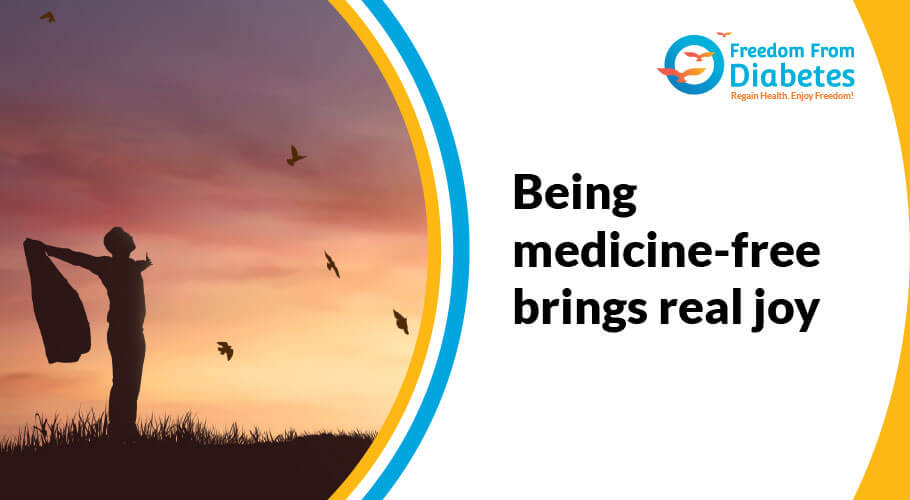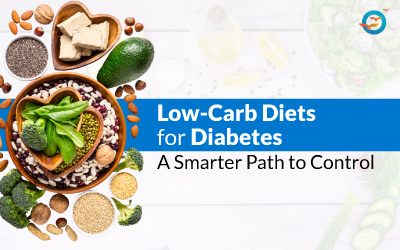Allopathy and Diabetes: Why should one aim at being medicine free?

Over the past few years irrespective of age and gender, the number of diabetics has increased significantly. So much so, there is one diabetic in almost every generation in every household. This has led to a situation where people are taking medicines every day for a very basic human need. Food.
It is commonly known that the goal in diabetes is to keep sugar level in a steady range to prevent damage to vital orans such as the heart, kidneys, brain and blood vessels. Sadly most people live out their lives with the belief that diabetes management is possibly only with medicines.
The 4 aspects this article will cover.
- In general, when are medicines necessary ?
- What is the root cause in diabetes ?
- What is the role of medicines in the diabetes management process ?
- Why should one stop the medicines
Are medicines necessary in general?
Well, yes and no.
In acute emergency situations such as a heart attack and chronic conditions, especially potentially life threatening such as epilepsy, yes, medicines are an absolute boon. They help the body survive and allow us to live longer lives whilst retaining a sense of normality.
However, in lifestyle conditions such as type 2 diabetes, hypertension and high cholesterol, no, since medicines were meant to serve as supports to modifications in diet and exercise. They can’t reverse the condition in isolation.
It’s also important to know that most medications are engineered to work on symptoms not treat the cause. Take for e.g. painkillers: A headache is mostly a symptom of an underlying cause such as hyperacidity which could have resulted from skipping a meal.
By taking a painkiller we have blocked the symptom but haven’t tackled the cause which was acidity. Ironically painkillers cause acidity themselves hence painkillers are often given in tandem with anti-acidity medicines and told to be consumed with food. So, the very solution is infact worsening the cause, whilst blinding us to it at the same time.
Some of the most common medicines used in diabetes are
- Tab Daparyl (dapagliflozin propanediol monohydrate )
- Tab Vogli 0.3 mg (Voglibose and Metformin)
- Tab Amaryl 2mg (active ingredient: glimepiride)
- Tab Reclimet 80/500 mg (Gliclazide and Metformin)
- Tab Semi Reclimet (Gliclazide and Metformin)
- Tab Glycomet 500 mg (Glimepiride and Metformin)
- Tab Glucobay 50 mg (Acarbose and Metformin)
- Tab Tendia 20 mg (Teneligliptin)
- Tab Jalra 50 mg. (Vildagliptin)
- Tab Jardiance 25 mg (active ingredient, empagliflozin)
- Tab Reclide 40 mg.(Gliclazide)
What is the root cause in Diabetes?
High blood sugar is a symptom of two key underlying causes.
- Having inadequate ability to secrete insulin
- Having sufficient insulin being secreted yet being insulin resistant.
While the first situation requires a person to take external insulin the second situation can be mostly treated by reducing the underlying insulin resistance.
Unfortunately most people keep taking medicines without making the requisite changes to their lifestyle while the root causes remain untreated. This results in complications being simply delayed not denied.
It’s akin to driving a car at night with the headlights off. As long as the medicine is in your system the lights are on, the minute the medicine effect is over, your body is driving blind.
So, what is insulin resistance?
As described by Dr. Roy Taylor, the father of diabetes described a unique situation called a Twin Cycle Hypothesis. It works like this,
- Assuming a person keeps taking medicines and eating excess calories
- These excess calories cause excess fat in the liver making the liver insulin resistant.
- Excess fat in the liver is passed on to the pancreas, causing the insulin producing cells to fail and again high sugars.
*Hepatic Steatosis means fat in the liver
What role do medicines play in this entire process?
Common diabetes medications typically control blood sugar in the following ways
- Reducing the liver’s ability to make and release sugar into the blood
- Helping the body produce more insulin
- Help make muscles and fat more sensitive to insulin
- Excrete sugars from urine
Common side effects of these medicines are
One of the critical aspects of diabetes medications is they have to be taken daily, often multiple times a day. Some common gastrointestinal side effects of oral diabetes medications such as Metformin Sulfonylureas, Thiazolidinediones, Meglitinides are
- Diarrhoea
- Constipation
- Bloating
- Gas (flatulence)
- Upset stomach
- Nausea.
While these side effects can be attributed to almost any medication, the side effects unique to diabetic medicines are
1. Increased and frequent hunger
Since all diabetic medications reduce blood sugar, a person will become hungry frequently. Also, most diabetics over eat as they fear hypoglycaemia with time their condition keeps worsening. This leads to snacking and a subsequent spike in sugar level around the clock.
2. Interference in the natural functioning
The human body is designed to always attempting to return to normal, a process called homeostasis. i.e. to function independent of medications.
Since these medicines work on reducing the symptoms, there is no effect on the primary cause which is insulin resistance. Hence the body remains stuck in a limbo where it is unable to heal.
3. Fertility issues
Delayed conception and high-risk pregnancies are some of the common scenarios observed in diabetic mothers-to-be.
4. Weight gain
When on medication, weight loss becomes difficult due to the cycle of hunger and excess food intake. Also in the absence of exercise most of the excess calorie intake is converted to fat and stored, compounding the problem.
5. Gastrointestinal flora imbalance and Micronutrient deficiency
Medicines are known to disrupt gastrointestinal flora. This leads to long term micronutrient deficiency and a range of problems because of this.
How does one go off diabetes medications?
The key to living a medicine free life is 3 fold.
- Reduce insulin resistance following a customised diet and exercise regimen.
- Systematically reduce the body’s dependence on medicines to maintain sugar levels and taper them under guidance of a physician.
- Once the body reverses and stabilizes continue to eat a clean diet and perform daily exercise which will prevent insulin resistance from setting in.

